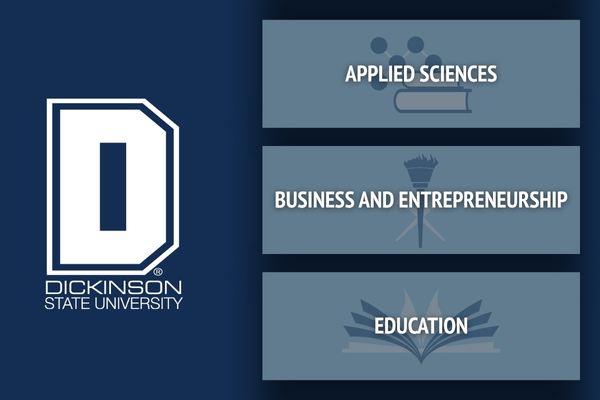Dickinson State University (DSU) is implementing a strategic change to its academic structure to enhance student success, promote academic excellence and strengthen workforce alignment. Following a comprehensive review of the university’s Academic Vital Sign reports, its strategic plan, and consultation with university leadership, DSU has announced the dissolution of the School of Professional Studies (SoPS) to support the future development of a School of Health Sciences.
This academic restructuring represents a significant step forward for the university. It is designed to streamline operations, reduce administrative redundancies, and improve DSU’s ability to serve students and communities with innovation and clarity.
As part of the reorganization, Health, Nutrition, and Exercise Science programs will now be housed within the School of Education (SoE). Ann Wittkopp will serve as assistant dean of the SoE and director of athletic training. In this role, she will also support the development of the proposed Master of Science in Athletic Training.
The Fire Science program will transition to the School of Applied Sciences (SoAS) under the leadership of Dean Liz Freedman. The move reflects the program’s applied, workforce-oriented mission and is expected to create new opportunities for interdisciplinary collaboration.
Social science programs, including criminal justice and psychology, will be overseen by Amy Grinsteinner, who will serve as assistant dean of the SoE – Social Sciences. Her leadership aims to support the continued growth of these disciplines.
In addition, a role of assistant dean of the School of Business and Entrepreneurship (SoBE) has been added to the academic structure, a position that will be an internal promotion. This position will provide academic support during a year of transition and growth within the school.
“This academic reorganization is rooted in our commitment to continuous improvement and student success,” said Dr. Holly Gruhlke, Vice President for Academic Affairs. “By aligning our programs more intentionally with workforce needs and reducing administrative complexity, we are positioning DSU to be more responsive, more innovative, and more effective in preparing students for the opportunities ahead. I’m deeply grateful to our faculty and staff for their collaborative spirit and shared focus on what’s best for our students.”
These changes reflect DSU’s ongoing commitment to student-centered leadership, sustainable program development and adaptability in meeting workforce demands, particularly in the health sciences. The university extends its gratitude to faculty and staff for their professionalism and support throughout this transition.

